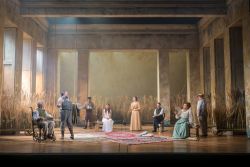FringeReview Scotland 2025

The Seagull
Royal Lyceum Theatre Company

Genre: Classical and Shakespeare, Drama, Theatre
Venue: The Royal Lyceum, Edinburgh.
Festival: FringeReview Scotland
Low Down
Written in 1895, first produced in 1896, though not seen onstage by the playwright, Anton Chekhov until 1899, The Seagull tells the tale of fading actress Irina Arkadina, her radical playwright son, Konstantin and their romantic and artistic conflicts. Considered one of Chekhov’s masterpieces the entanglements have schoolteacher, Medvendenko in love with Masha, who is in love with Konstantin who loves Nina, who falls for and runs off with Trigorin, who is in a relationship with Konstantin’s mother, Irina. They play out these dramatic clashes in the country home with Irina’s brother, Sorin, who employs servant Yakov and Shamrayev, a boorish manager of the Estate constantly embarrassing his wife, Polina, who has a thing for the local Dr, Dr. Dorn, who was once considered a great catch. A great tragedy ensues, with comic undertones.
Review
Initially conceived by Chekhov as a comedy it has come to represent tragedy in his cannon for some, however here director James Brining brings that comic flair underneath t the fore. And so, when John Bett as Sorin declares, it’s so clammy I hope there will be a storm. We are clearly in for a storm in a samovar.
Reimagined in a new translation by Mike Poulton, this version retains the tension of each relationship and adds that layer of familiar Scots
to provide some of light relief and humour. I could have wished for more of the language in the more dramatic moments to legitimise its use.
Introducing himself to his audience as the new Artistic Director of the Royal Lyceum, Brining, with stellar cast members like the aforementioned Bett, Forbes Masson and Caroline Quentin could be described as both bold and safe. The new translation manages to tip closer to a bold reimagining which becomes a relaxed and safe production. What we get is the necessary ensemble, settled not a beautifully crafted piece of performance.
The ensemble works when they are working towards a collective whole of both the comic sets of circumstances from which are fashioned startled looks and withering comments, that open up the absurdity of some of the behaviours and inter relationships. The ending, therefore, settles into narrative as something which shocks but is neither surprise nor is it wholly tragic. It makes sense that what has happened offstage should be told to those who will be most affected offstage too. It is about sensibilities and not confronting the truths and realities that we, as an audience can see and foresee.
Performances are admirable with Lorn MacDonald exhibiting naivete, vulnerability and fragility throughout as Konstantin. And though much has been made of Caroline Quentin performing on the Edinburgh stage as Irina Arkadina there are a number of performances in here which manage to match her. As Polina Irene Allen manages to convey the frustration at her husband and at the lack of interest coming back from Dr. Dorn with great skill. As Trigorin, seen by many as the role of the play, Dyfan Dwyfor captures the allure and the aloofness, the desire that rumbles underneath within the pleasantries until offstage we hear of his giving in, until he is made to return with his tail up rather than between his legs. As Masha, Tallulah Greive who is utterly bereft, and married to schoolteacher Medvendenko, gives us that angry and embittered woman of her time which acts as a counterpoint to Michael Dylan’s awkward and staid schoolteacher – she the fire and he the melting and fawning fool. Stephen McNicoll as Shamrayev is that annoying loud individual in every household that completely and utterly bemuses and upsets his long-suffering wife Polina. As Nina, Harmony Rose-Bremner manages provides the wonderfully tragic, hopeful and helpless, yet wholly enthusiastic Nina. As Sorin John Bett manages a fantastic comic and dramatic turn. Is he really supposed to be 60… Bett delivers a degree of gravitas. Kristian Lustre does exactly what he needs to as Yakov – though his engagement throughout should never be underestimated.
Both Forbes Masson and Caroline Quentin as Dr Dorn and Irina Arkadina hold much of the focus together with vocal dexterity, movement and looks and suggestions which is well delivered. But again, they perform within a platform of an ensemble, they are not the star turns, but the solid foundation which then benefits from the skills around them to give fantastic performances.
The creative team have managed a sumptuous and delightful backdrop. Costume through Madeleine Boyd and Anna Kelsey, sound design and composition from Michael John McCarthy – especially in the scene change in the second half – and set between Colin Richmond as the designer and co-set designer Anna Kelsey – easy to ee why costumes and set blend so well together. Visually the tones and colours were emergent of an autumn through which we are currently experiencing, and the destination of the final scene was in contrast to the sweet subtle tones. It was a sumptuous backdrop to a classic text set within a beautifully classic theatre. Added to that the lighting design by Lizzie Powell was similarly blended into the visual treat.
The Seagull has started James Brining’s time at the Royal Lyceum and having classic texts within a classic theatre could have been either bold or safe – and here it is a visual treat with ensemble meaning more than just onstage but along with the theatrical arts being sued to such impressive effect. It would appear that Scotland’s ability to host the classics is once again in very safe and forward-thinking hands.




























